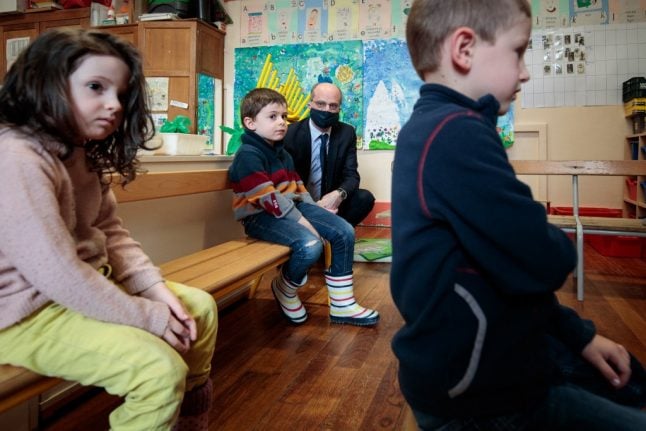While most schools in France are now open, limits on class sizes mean that many pupils are only attending part time, while other parents have opted to keep their children at home.
However, this is set to change, after president Emmanuel Macron is his address to the nation on Sunday night declared: “As of Monday, in France and overseas French territories, nurseries, schools and secondary schools will prepare to welcome all students.”
“From June 22nd,” the president continued, “attendance will be compulsory.”
On Monday the education minister Jean-Michel Blanquer added that the rule requiring 4 m sq of space per pupils – which had dramatically limited class sizes – will be scrapped.
“The fundamental reduction is that of physical distance,” he told Europe 1. Instead of the 4m sq required until now around each child, the physical distance will be “one metre laterally between pupils”, he detailed.
“This allows us to accommodate all students.”
Schools in France closed on March 16th, the day before the nationwide lockdown began, although some local authorities in 'cluster' areas had closed their schools down earlier.
They began to reopen from May 11th, at first only primary schools.
The reopening was extended to all schools from June 2nd, but limits on class sizes – a maximum of 15 pupils in schools and 10 in nurseries – meant that many children were only attending for part of the week.
Data from June 4th showed that only around a quarter of pupils were back in school.
Since the reopening began, parents had been able to decide whether to send their children back or not, with many opting to continue home schooling.
However, from June 22nd, attendance will be compulsory again and any parents who wish to continue home schooling on a permanent basis will have to go through the process to be registered with their local authority.
The next week will be taken up with preparation time for schools as they prepare to welcome all pupils back from June 22nd.
Although it will be a brief return – schools in France break up for summer holidays on Friday, July 4th and the government has already ruled out extending the summer term or introducing extra classes.
The minister defended this decision, saying “Every day counts in the life of a student.
“The fundamental objective, and I've been saying this from the beginning, is that there should not be a break for students between March and September, which is the case in Italy. But we all know that this can create social and educational damage. Children need to go to school.”
The announcement did not concern lycée – high school – students, who are usually doing exams at this time of year – or universities, which are largely set to continue online teaching until September.
But centres de loisirs, which operate over the summer holidays proving activities and childcare, will go ahead this summer, it has been confirmed.



 Please whitelist us to continue reading.
Please whitelist us to continue reading.
Member comments